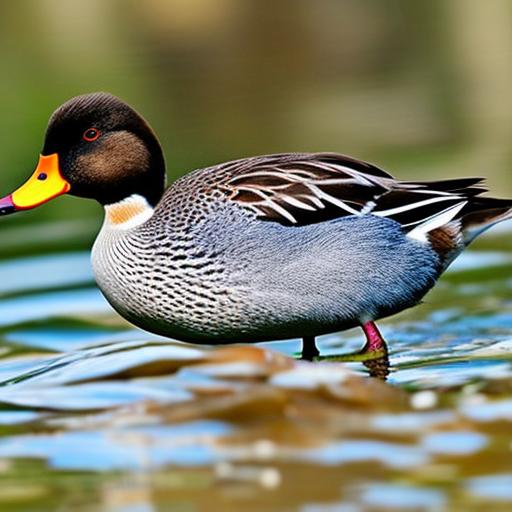Nova Scotia Duck Tolling Retrievers are a unique and beautiful breed of dog that have gained popularity in recent years. These dogs are known for their striking red coats and their ability to lure and retrieve waterfowl. When looking to add a Nova Scotia Duck Tolling Retriever to your family, it is crucial to choose a reputable breeder. This article will explore the history and origin of the breed, the characteristics and traits of these dogs, the importance of choosing a reputable breeder, breeding practices and standards, health concerns and precautions, training and socialization, finding and selecting a breeder, the responsibilities of breeder owners, and the future of the breed.
Key Takeaways
- Nova Scotia Duck Tolling Retriever Breeders are specialized breeders who focus on breeding and raising this unique breed of dog.
- The Nova Scotia Duck Tolling Retriever has a rich history and origin in Canada, where it was bred for hunting and retrieving waterfowl.
- This breed is known for its intelligence, loyalty, and high energy levels, making it a great companion for active families.
- It is important to choose a reputable breeder who follows ethical breeding practices and adheres to breed standards to ensure the health and well-being of the puppies.
- Health concerns such as hip dysplasia and eye problems should be taken into consideration when selecting a breeder and caring for a Nova Scotia Duck Tolling Retriever.
History and Origin
The Nova Scotia Duck Tolling Retriever, also known as the Toller, originated in Nova Scotia, Canada in the early 19th century. The breed was developed by hunters who wanted a dog that could lure ducks within range of their guns. The Toller’s unique hunting technique involves playing along the shoreline to attract the curiosity of ducks, then retrieving them once they are within range.
The breed’s ancestors include various retrievers, spaniels, and setters. It is believed that they were crossed with small red European decoy dogs brought to Nova Scotia by European fishermen. These dogs were known for their ability to lure ducks towards nets or traps. Over time, breeders selectively bred these dogs with other retrievers to create the Nova Scotia Duck Tolling Retriever we know today.
Characteristics and Traits
Nova Scotia Duck Tolling Retrievers are medium-sized dogs with a distinctive red coat that ranges from golden red to dark copper. They have a dense double coat that is water-repellent, allowing them to work in cold water without getting wet or cold. Their tails are thick and furry, often described as a “plume,” which they use to wag enthusiastically while working.
In terms of temperament, Tollers are known for being intelligent, alert, and energetic. They are highly trainable and eager to please their owners. They are also known for being affectionate and loyal towards their families. Tollers are excellent family dogs and get along well with children and other pets when properly socialized.
Importance of Choosing a Reputable Breeder
Choosing a reputable breeder is of utmost importance when looking to add a Nova Scotia Duck Tolling Retriever to your family. Reputable breeders prioritize the health and well-being of their dogs and strive to produce puppies that conform to the breed standard. They carefully select breeding pairs based on health, temperament, and conformation to ensure the best possible offspring.
On the other hand, irresponsible breeders may prioritize profit over the health and welfare of their dogs. They may engage in unethical breeding practices, such as breeding dogs with known health issues or breeding excessively for profit without regard for the breed standard. This can result in puppies with genetic health problems or behavioral issues.
Breeding Practices and Standards
Reputable breeders follow strict breeding practices and adhere to breed standards set by kennel clubs and breed organizations. They carefully select breeding pairs based on health, temperament, and conformation to ensure that the puppies they produce are healthy and meet the breed standard.
Health testing and genetic screening are essential components of responsible breeding practices. Reputable breeders will conduct various health tests on their breeding dogs to identify any potential genetic health issues. These tests may include hip and elbow evaluations, eye examinations, and DNA tests for specific genetic diseases that are known to affect the breed.
Health Concerns and Precautions

While Nova Scotia Duck Tolling Retrievers are generally healthy dogs, like all breeds, they are prone to certain health concerns. Some common health issues that can affect Tollers include hip dysplasia, progressive retinal atrophy (PRA), and autoimmune disorders.
To minimize the risk of these health issues, reputable breeders will conduct health tests on their breeding dogs and only breed those that are free from known genetic health problems. They will also provide proper veterinary care for their dogs, including regular vaccinations, deworming, and preventive treatments for parasites.
Training and Socialization
Training and socialization are crucial for Nova Scotia Duck Tolling Retrievers. These dogs are intelligent and eager to please, making them highly trainable. However, they can also be independent and stubborn at times, so consistent and positive reinforcement training methods work best.
Socialization is equally important to ensure that Tollers grow up to be well-rounded and well-behaved dogs. Early socialization exposes them to different people, animals, environments, and experiences, helping them develop into confident and friendly adults.
Breeders play a vital role in preparing their puppies for their new homes by providing early socialization experiences and basic training. They may expose the puppies to various stimuli, such as different sounds, surfaces, and objects. They may also introduce the puppies to other dogs and people to help them become comfortable in different social situations.
Finding and Selecting a Breeder
When looking for a reputable Nova Scotia Duck Tolling Retriever breeder, it is essential to do thorough research. Start by contacting local breed clubs or national breed organizations for recommendations. These organizations often have breeder referral programs or can provide a list of breeders who adhere to their code of ethics.
It is also important to visit the breeder in person before making a decision. This allows you to see the living conditions of the dogs and assess the overall health and well-being of the breeding dogs and puppies. A reputable breeder will be open and transparent about their breeding practices, health testing, and the care they provide for their dogs.
Responsibilities of Breeder Owners
Owning a Nova Scotia Duck Tolling Retriever comes with several responsibilities. Breeders have a duty to provide proper care and training for their dogs, as well as to ensure that the puppies they produce go to suitable homes.
Proper care includes providing a balanced diet, regular exercise, veterinary care, and mental stimulation. Breeders should also prioritize the health and well-being of their dogs by conducting health tests, genetic screening, and regular check-ups.
Additionally, breeders should carefully screen potential puppy buyers to ensure that they are committed to providing a loving and responsible home for the puppy. They should be willing to answer any questions and provide ongoing support and guidance to the new owners.
Conclusion and Future
In conclusion, choosing a reputable breeder is crucial when looking to add a Nova Scotia Duck Tolling Retriever to your family. Reputable breeders prioritize the health and well-being of their dogs and strive to produce puppies that conform to the breed standard. They follow responsible breeding practices, conduct health tests, and provide proper care and training for their dogs.
The future of the Nova Scotia Duck Tolling Retriever breed relies on responsible breeders who are committed to preserving the breed’s unique characteristics and ensuring its long-term health and welfare. By choosing a reputable breeder, you can help support these efforts and bring home a healthy and well-adjusted Toller that will be a cherished member of your family for years to come.
If you’re a Nova Scotia Duck Tolling Retriever breeder, you might also be interested in learning about chicken keeping. Poultry Wizard has a helpful article on “How Many Chickens Do You Need for a Family of 4?” This article provides insights into the number of chickens required to meet the egg needs of a family of four. Understanding this can help you plan your chicken coop and breeding strategies more effectively. Check out the article here for more information.
FAQs
What is a Nova Scotia Duck Tolling Retriever?
A Nova Scotia Duck Tolling Retriever is a medium-sized breed of dog that originated in Nova Scotia, Canada. They were originally bred to lure and retrieve waterfowl for hunters.
What should I look for in a Nova Scotia Duck Tolling Retriever breeder?
You should look for a breeder who is knowledgeable about the breed, has a good reputation, and is willing to answer any questions you may have. They should also provide health clearances for their breeding dogs and be willing to show you the puppies’ parents.
What health issues are common in Nova Scotia Duck Tolling Retrievers?
Some health issues that are common in this breed include hip dysplasia, progressive retinal atrophy, and autoimmune diseases. It is important to choose a breeder who screens their breeding dogs for these and other health issues.
How much exercise does a Nova Scotia Duck Tolling Retriever need?
This breed is very active and requires a lot of exercise. They should have at least an hour of exercise each day, which can include walks, runs, and playtime.
Are Nova Scotia Duck Tolling Retrievers good with children?
Yes, this breed is known for being good with children. They are friendly, playful, and patient, making them a great family pet.
Do Nova Scotia Duck Tolling Retrievers shed?
Yes, this breed does shed. They have a thick double coat that sheds seasonally, so regular brushing is necessary to keep their coat healthy and reduce shedding.
Meet Walter, the feathered-friend fanatic of Florida! Nestled in the sunshine state, Walter struts through life with his feathered companions, clucking his way to happiness. With a coop that’s fancier than a five-star hotel, he’s the Don Juan of the chicken world. When he’s not teaching his hens to do the cha-cha, you’ll find him in a heated debate with his prized rooster, Sir Clucks-a-Lot. Walter’s poultry passion is no yolk; he’s the sunny-side-up guy you never knew you needed in your flock of friends!




